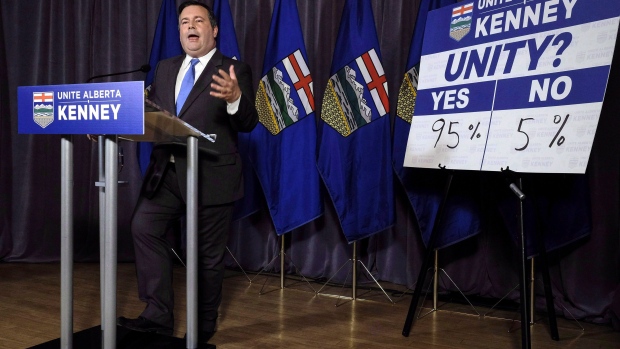Jul 24, 2017
Conservative Party merger alters landscape in Canada's oil patch
, Bloomberg News

The merger of Alberta’s two main conservative parties creates a new political force in the heart of Canada’s oil patch that threatens to unseat Premier Rachel Notley and kill the province’s carbon tax.
Members of the Wildrose and Progressive Conservative parties voted Saturday to create the United Conservative Party. Combined, those parties hold 30 of 87 districts, though they received 52 percent of the vote in the last election.
In recent polls each has outpaced Notley’s New Democratic Party, which won a surprise majority in 2015 and benefited heavily from a split among right-leaning voters in the province with Canada’s highest median household income. The next election is due in 2019.
For the NDP, unification “is their worst-case scenario,” Duane Bratt, a political scientist at Mount Royal University in Calgary, said in an interview. While an improving economy or a divide over social policies could still help Notley hold power, “a unified conservative party at this stage would be tough to beat.”
Some 95.4 percent of Wildrose members who voted backed the merger, while it won 95 percent support from the PCs, according to the results announced Saturday.
CARBON TAX
While the merger agreement doesn’t specify a plan to repeal the carbon tax, its key figures have all campaigned against it. Notley’s carbon measures include a hard cap on emissions from Alberta’s oil sands, the world’s third-largest proven oil reserve, though the province isn’t near its self-imposed cap. Repeal of that will set up a collision course with Prime Minister Justin Trudeau, who has imposed a minimum carbon price nationally as of 2018.
Alberta is Canada’s heaviest carbon emitter, though only its fourth-most populous, and a frequent target of environmental and anti-oil campaigns.
“I’m not convinced that the carbon tax will disappear, and for evidence of that, all you have to do is look south of the border with repeal-and-replace of Obamacare,” Bratt said. “Once you bring in a program and it runs for a couple of years, it is tough to get rid of.”
The parties had also pledged to balance the budget and slash Alberta’s ratio of debt to nominal gross domestic product, which has more than doubled in the past two years, to 13.8 percent from 6.1 percent, with the slump in oil prices. Alberta draws 8 percent of its revenue from oil and other non-renewable resources, down from 18 percent just three years earlier, government budget documents show.
DISAPPROVAL RATING
The unified party will pick its leader on Oct. 28, with an interim leader serving in the meantime. The leading candidates are expected to be Wildrose leader Brian Jean, a former federal lawmaker who hails from Fort McMurray, the hub of the oil sands region, and Progressive Conservative leader Jason Kenney, a former federal lawmaker and cabinet minister who largely led the unity push. Doug Schweitzer, a Calgary lawyer, announced his interest in the leadership position in June.
“If anybody other than myself is elected by the members they will have my total enthusiastic support because this unity project will only work if we are prepared to park our egos --- and I’m certainly prepared to do that," Kenney said in his Saturday speech.
Notley has one of the highest disapproval ratings among Canada’s provincial leaders, though the premier’s numbers remain relatively strong in each of the two major cities, where about two-thirds of electoral districts are clustered, polling from Mainstreet Research shows.
“It’s going to be a tough road for Rachel Notley and the NDP if the PCs and Wildrose unite -- not impossible,” Mainstreet President Quito Maggi said in an interview. The merger could still spur further splintering, both among staunch conservatives and centrists. “It’s not a guarantee of that unified party forming government. They’re still going to have to do some work.”


